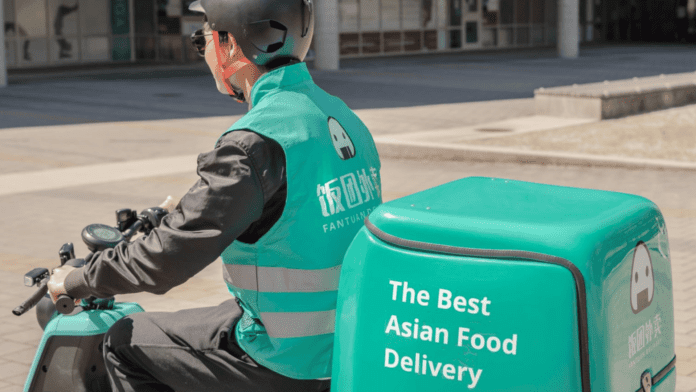When individuals relocate from China to other countries, one aspect they often long for is the convenience offered by food delivery applications. Over the last nine years, Fantuan, a company based in Vancouver, has dedicated itself to recreating the essence of Chinese food delivery platforms in Western regions. Recently, the company secured additional funding to enhance its mission of delivering genuine Asian cuisine to a global audience.
Fantuan, translating to “rice balls” in Chinese, secured $40 million in a Series C funding round spearheaded by Celtic House Asia, a venture capital firm specializing in investments in first-generation immigrants. GrubMarket, the food supply chain upstart that achieved a valuation exceeding $1 billion in 2021, also played a significant role in leading the funding round.
Additional contributors in the funding round encompass Vision Plus, a venture capital firm founded by Eddie Wu, recently appointed as the chief executive officer at Alibaba, and boutique private equity firm JSD Capital. The company opted not to reveal its valuation following the successful fundraising.
In addition to institutional investors, Fantuan also raised capital from several powerbrokers in China’s retail tech space. This group includes the co-founders of Ele.me, a food delivery pioneer gobbled up by Alibaba in 2018; Bianlifeng, an unmanned convenience store chain; Qunar, a GGV-backed travel booking site acquired by its bigger rival Ctrip; and Dianping, the more powerful Chinese counterpart of Yelp owned by food delivery giant Meituan.
Inspired by the growing prominence of food delivery applications in China, Randy Wu founded Fantuan in 2014 while pursuing an economics degree at Simon Fraser University. Initially managing the business single-handedly, Wu took on multiple roles, even personally delivering food across Vancouver. Eventually, he made the decision to leave college and dedicate himself full-time to what he saw as his opportunity to replicate the success of Chinese models, with Meituan serving as his primary reference point.
Shortly after the establishment of Fantuan, Randy Wu found a partner in Yaofei Feng, whom he had connected with online through their shared interest in playing Dota. Impressed by Wu’s entrepreneurial initiative, Feng decided to take a bold step, leaving his position as a software engineer at Amazon in Seattle and relocating to Vancouver to join the venture.
The founders placed their bets on the increasing demand for top-notch Asian cuisine in Western nations, driven by the migration of millions of Chinese individuals abroad. According to a 2020 report by the International Organization for Migration, the global count of international migrants of Chinese origin had reached approximately 10 million.
“Having food from one’s homeland serves as a form of spiritual solace when living abroad,” expressed Wu. “I distinctly recall my first Chinese meal, three months into my relocation to Saskatchewan, where Chinese cuisine was notably scarce.”
Fantuan aspires to go beyond merely providing delivery services. Drawing inspiration from Meituan’s model, the comprehensive platform for local services in China, the company aims to evolve into the ultimate destination for overseas Chinese, offering a one-stop solution for discovering and accessing various leisure activities.
Its collaboration with GrubMarket mirrors Meituan’s vertical expansion strategy, wherein the food delivery platform facilitates connections between restaurants and ingredient suppliers. By linking farmers with prominent customers such as Whole Foods and Costco, GrubMarket might view Fantuan as a pathway to potentially reach small, local restaurants in the future.
Within two years of its inception, Fantuan emerged as a leading Chinese food delivery platform in Vancouver and attained net profitability. Sustaining profitability for an additional five years, the company embarked on an ambitious expansion into the U.S. amid the challenges of the COVID-19 pandemic. Projections indicate that its annual revenue is expected to approach $100 million this year.
According to Wu, delivering Chinese food poses challenges due to the intricate cooking process, which is often time-consuming. Unlike platforms that cater to various cuisines, concentrating solely on one category results in a lower density of restaurants, consequently leading to extended delivery times. Nonetheless, Wu asserted that Fantuan has successfully maintained an average delivery time of 40 minutes across cities such as Vancouver, Toronto, London, San Francisco, and Sydney.
The availability of drivers impacts delivery times, especially in costly cities like San Francisco, where recruitment efforts may face challenges. Fantuan, preferring Chinese-speaking drivers for effective communication with immigrant restaurant owners, encounters difficulties in securing an adequate number of drivers. Wu noted that drivers are attracted to Fantuan due to the nearly “double” average order value from Chinese restaurants compared to mainstream food delivery platforms, resulting in higher tips.
At present, Wu indicates that Fantuan maintains a user retention rate of approximately 90% after five orders within a 24-month period. Out of its total of two million registered accounts, 1.2 million qualify as “active” users.
Wu asserts that one of Fantuan’s notable strengths lies in its capacity to onboard a diverse array of authentic Chinese and other Asian restaurants. The platform employs the on-the-ground sales approach frequently employed by Chinese tech firms dedicated to digitizing traditional retail. This strategy involves physically visiting customers and establishing in-person relationships.
“Our business development specialists would each manage around 80 restaurants and pay frequent visits to these customers, teaching them tips like how to do marketing and how to pack more efficiently for delivery,” said Wu.
Currently, Fantuan has a global workforce of approximately 500 individuals. Earlier this year, Yinfeng Lu, who previously served as a sales executive at Meituan, joined the company as its Chief Operating Officer.





